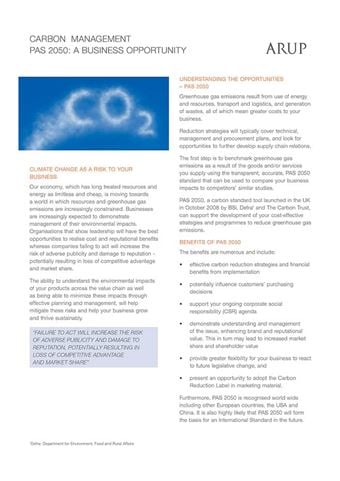The world’s first carbon footprint standard can help businesses increase efficiency and reduce costs while aiding decision-making for consumers.
PAS 2050 is the world’s first product carbon footprint “standard”. It aims to make carbon footprints of goods and services ("products") comparable so that businesses can better realise efficiencies in their supply chains (and resultant cost savings) and consumers making procurement decisions can be more informed on the associated carbon emissions of their purchases.
PAS 2050 is relevant to producers of goods and providers of services, as well as major procurers of products in the private and public sector. It provides a common basis for demonstrating ongoing carbon reduction initiatives, be they as a result of the Carbon Reduction Commitment (CRC), Greenhouse Gas Protocol and/or other corporate carbon reduction aims.
Arup has assisted the Carbon Trust with the development of Footprint Expert™, a toolkit aimed at delivering PAS 2050 assessments. Arup develops templates in Footprint Expert™ for businesses, enabling these businesses to undertake their own product carbon footprinting to PAS 2050.
This brochure sets out why PAS 2050 should be a consideration now - specifically how carbon footprinting goods and services to PAS 2050 provides the following benefits:
-
A basis for development of carbon reduction strategies by benchmarking performance, and quantifying emissions across the value chain.
-
An aid to procurement. By requesting a PAS 2050 number from suppliers, procurers can factor carbon emissions into purchasing decisions.
-
Cost reduction, by forging closer links with suppliers and increasing operational efficiencies.
-
Aids design of products, by allowing the carbon impact of alternative options to be evaluated before committing capital.
-
Demonstrates commitment to carbon reduction, providing opportunities to enhance brand and reputation, and maximise marketing opportunities.
-
Allows the optional use of a carbon reduction label, providing a powerful on-product message showing commitment to carbon reduction (recent market research shows that two-thirds of consumers want to see this from companies).
-
With predicted rising energy and resource costs, de-carbonising operations and supply chains leads to greater resilience and long term business sustainability.
-
Decreased risk of exposure to further potential legislation aimed at achieving the Government’s target of a 34% carbon reduction by 2020.
